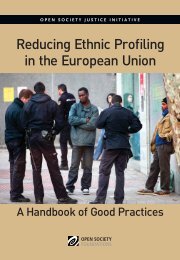individual communication to the united nations ... - Community Law
individual communication to the united nations ... - Community Law
individual communication to the united nations ... - Community Law
Create successful ePaper yourself
Turn your PDF publications into a flip-book with our unique Google optimized e-Paper software.
22The State of Vic<strong>to</strong>ria has failed <strong>to</strong> adopt sufficient legislative and practical protectionfrom and between private citizens, particularly where a home is part of a lease thatfalls outside <strong>the</strong> scope of a “residential tenancy”. There are no criminal sanctions forunlawful evictions and <strong>the</strong>refore no compulsion for police <strong>to</strong> intervene in matters suchas <strong>the</strong> Author‟s, as <strong>the</strong>se are usually dismissed as “civil matters”.The equivalent <strong>to</strong> Article 17 of <strong>the</strong> ICCPR in <strong>the</strong> European Convention on HumanRights („ECHR‟) is Article 8, which provides:1. Everyone has <strong>the</strong> right <strong>to</strong> respect for his private and family life, his home and hiscorrespondence.2. There shall be no interference by a public authority with <strong>the</strong> exercise of this rightexcept such as is in accordance with <strong>the</strong> law and is necessary in a democratic societyin <strong>the</strong> interests of national security, public safety or <strong>the</strong> economic well-being of <strong>the</strong>country, for <strong>the</strong> prevention of disorder or crime, for <strong>the</strong> protection of heath or morals,or for <strong>the</strong> protection of <strong>the</strong> rights and freedoms of o<strong>the</strong>rs.In Novoseletskiy v Ukraine, <strong>the</strong> Meli<strong>to</strong>pol State Teacher Training Institute (“<strong>the</strong>Institute”), which was <strong>the</strong> applicant's employer at <strong>the</strong> time, granted <strong>the</strong> applicantindefinite authorisation <strong>to</strong> occupy and use a two-room flat in a building in Meli<strong>to</strong>polon <strong>the</strong> Institute's books. The Institute annulled its decision and granted authorisation<strong>to</strong> occupy and use <strong>the</strong> flat <strong>to</strong> T., ano<strong>the</strong>r of its employees. T., accompanied by fourwitnesses, entered <strong>the</strong> flat. They noted that <strong>the</strong> flat was empty and made a statement<strong>to</strong> that effect. According <strong>to</strong> <strong>the</strong> applicant, his possessions were removed or s<strong>to</strong>lenfrom <strong>the</strong> flat. The Court observed in this case:68. The Court draws attention <strong>to</strong> its settled case-law, in accordancewith which Article 8, while primarily intended <strong>to</strong> protect <strong>the</strong> <strong>individual</strong>against arbitrary interference on <strong>the</strong> part of <strong>the</strong> public authorities, mayalso entail <strong>the</strong> adoption by <strong>the</strong> latter of measures <strong>to</strong> secure <strong>the</strong> rightsguaranteed by that Article even in <strong>the</strong> sphere of relations between<strong>individual</strong>s (see, among many o<strong>the</strong>r authorities, López Ostra v. Spain,judgment of 9 December 1994, Series A no. 303-C, pp. 54-55, § 51,and Surugiu v. Romania, no. 48995/99, § 59, 20 April 2004).69. Whe<strong>the</strong>r <strong>the</strong> case is analysed in terms of a positive duty on <strong>the</strong>State or in terms of an interference by a public authority <strong>to</strong> be justifiedin accordance with paragraph 2, <strong>the</strong> applicable principles are broadlysimilar. In both contexts regard must be had <strong>to</strong> <strong>the</strong> fair balance that has<strong>to</strong> be struck between <strong>the</strong> competing interests of <strong>the</strong> <strong>individual</strong> and of<strong>the</strong> community as a whole. Fur<strong>the</strong>rmore, even in relation <strong>to</strong> <strong>the</strong> positiveobligations flowing from <strong>the</strong> first paragraph of Article 8, in striking <strong>the</strong>required balance <strong>the</strong> aims mentioned in <strong>the</strong> second paragraph may beof a certain relevance (see Moreno Gómez v. Spain, no. 4143/02, § 55,ECHR 2004-X).70. Moreover, <strong>the</strong> scope of this obligation will inevitably vary in <strong>the</strong>light of <strong>the</strong> diversity of situations obtaining in Contracting States and<strong>the</strong> choices that must be made in terms of priorities and resources. NorAshling Gandy v Australia, Individual Communication <strong>to</strong> <strong>the</strong> Human Rights Committee
















